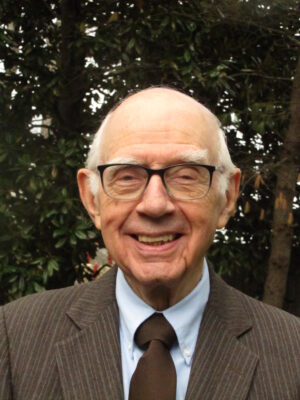Hercules, Centennial Professor of Chemistry, emeritus, has died
David Hercules, Centennial Professor of Chemistry, emeritus, who served as the chair of the Department of Chemistry for eight years, died January 20, 2024, after a battle with cancer. He was 91.
 Born in Somerset, Pennsylvania on August 10, 1932, Hercules developed an interest in science at an early age, spurred by the gift of a chemistry set from his aunt Elsie. As a boy, his interest in science expanded to electronics and he developed a fully functional radio station in his town, which was eventually shut down by the FCC.
Born in Somerset, Pennsylvania on August 10, 1932, Hercules developed an interest in science at an early age, spurred by the gift of a chemistry set from his aunt Elsie. As a boy, his interest in science expanded to electronics and he developed a fully functional radio station in his town, which was eventually shut down by the FCC.
In addition to science, David was very interested in music, playing the cornet and the French horn through high school and college. He considered pursuing a career in music, but science won out. Hercules went on to become a pioneer of analytical protocols using electron spectroscopy.
He received his bachelor’s degree in chemistry from Juniata College in Huntingdon, Pennsylvania in 1954 and his Ph.D. from the Massachusetts Institute of Technology in 1957. He held appointments at Juniata, MIT, the University of Georgia, and the University of Pittsburgh before joining Vanderbilt as Centennial Professor of Chemistry in 1995. Hercules was chair of the chemistry department from 1995 to 2003. He retired in 2007, but remained in a research professor role, actively publishing into his nineties, authoring more than 500 scientific papers through his career.
“The impact of David Hercules is difficult to quantify both personally and professionally,” said John McLean, Stevenson Professor of Chemistry. “When scientists describe their discoveries as standing on the shoulders of giants—David is a giant of the grandest scale. His incredible contributions through mentorship, teaching, leadership, and scientific discovery have impacted countless individuals that will have long lasting impact on the lives and communities that he has touched.”
A world-renowned expert in analytical chemistry, he served as the chairman of the Analytical Division of the American Chemical Society. Hercules received both the Analytical Chemistry Award and the Surface Science Award from the ACS. He was a Guggenheim Memorial Fellow, a winner of the Alexander von Humboldt Prize, and a recipient of the Society for Applied Spectroscopy’s Lester Strock Medal and the Spectroscopy Society of Pittsburgh Award.
“David was fierce, determined, and demanded excellence,” said Sandra Rosenthal, Jack and Pamela Egan Professor of Chemistry and department chair. “There is no question that he is the catalyst that propelled Vanderbilt chemistry into the top tier of programs nationally.”
At Vanderbilt, he won the Earl Sutherland Prize for Achievement in Research in 2002 and the University Distinguished Faculty Award in 2003. Beyond research, David loved teaching students. He once received the Excellence in Teaching Award from the Student Affiliates of the American Chemical Society.
“Dave Hercules was a legend in analytical chemistry, and a visionary leader who fundamentally changed the course of multiple chemistry departments, including ours at Vanderbilt,” said David Cliffel, Cornelius Vanderbilt Professor of Chemistry.
David is survived by his wife of 53 years, Shirley Hoover Hercules, daughter Sherri Kathryn Sokolovich, son-in-law Budimir Sokolovich, son Kevin Michael Hercules, daughter-in-law Marria Paccassi, and four grandchildren–Katie Correia, Zackarije Sokolovich, Nikola Sokolovich, and Elizabeta (Ella) Sokolovich.
Services will be held at St. George’s Episcopal Church in Nashville on Friday January 26, 2024. Visitation is from 2-3:30 p.m. followed by a memorial service at 3:30 p.m.
